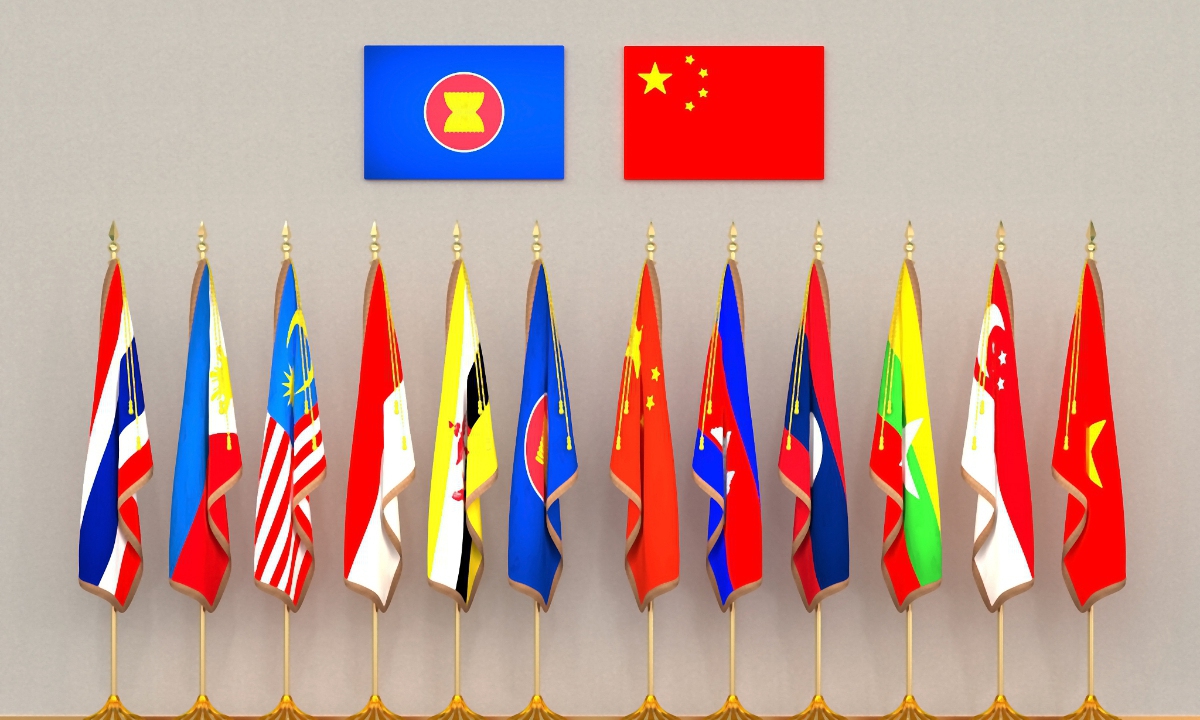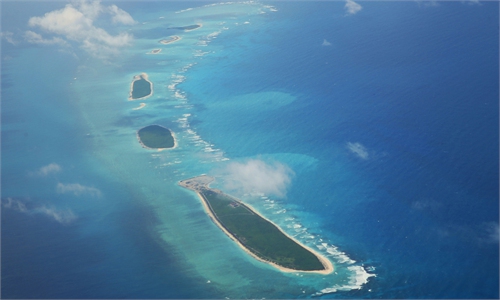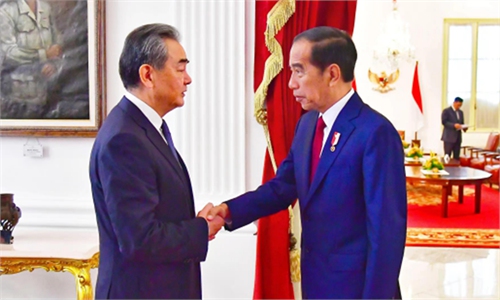Chinese FM arrives in Laos with cooperation in mind
SCS disputes won't override ASEAN's main course despite Philippine moves: analyst

China ASEAN Photo:VCG
Chinese Foreign Minister Wang Yi on Thursday arrived in Lao capital Vientiane to attend the ASEAN meetings and other events against the backdrop of turbulence in the South China Sea, but analysts believed the tensions will not have a major impact on the main course of cooperation.
The Philippines hopes to utilize the ASEAN events to endorse its stance, but other ASEAN members understand the complexity and sensitivity of the topic, and recognize the bloc's priority as being development and prosperity, they said.
Wang, also a member of the Political Bureau of the Communist Party of China (CPC) Central Committee, met with general secretary of the Lao People's Revolutionary Party Central Committee and Lao President Thongloun Sisoulith in Vientiane on Thursday.
Wang said the third plenary session of the 20th CPC Central Committee proposed more than 300 reform tasks, outlined a blueprint for deepening reform across the board, and sent a clear signal that reform and opening-up will always be in progress.
China appreciates that Laos has always stood with China on issues concerning China's core interests and major concerns, and will continue to be the most reliable friend and partner of Laos, ready to enhance experience sharing with Laos on governance, Wang said.
China firmly supports Laos in exploring a development path suited to its own and in safeguarding its national sovereignty and dignity, willing to deepen all-round cooperation with Laos, strengthen comprehensive development along the China-Laos Railway and promote connectivity to boost Laos' economic development, said the foreign minister.
During the meeting, Thongloun said that the important conclusions and innovative achievements of the third plenary session of the 20th CPC Central Committee have provided important references for Laos to promote the socialist cause.
In his meeting with Lao Prime Minister Sonexay Siphandone on Thursday, Wang said both sides should carry forward their traditional friendship, deepen their construction of a China-Laos community with a shared future, and achieve high-standard, high-quality and high-level collaboration and coordination, making their relationship one of the best among China's neighboring countries.
Sonexay Siphandone said the country stands ready to promote a new version of the action plan on building a Laos-China community with a shared future and expand practical cooperation with China on all fronts, Xinhua reported.
The prime minister said that the Laos-China Railway provided strong momentum for Laos to transform from a land-locked to a land-linked nation, adding that the country welcomes more capable Chinese enterprises to invest in Laos, helping to deepen regional interconnectivity and safeguard regional supply chain stability.
From Thursday to Saturday, Wang will attend the ASEAN-China Foreign Ministers' Meeting, the ASEAN Plus Three Foreign Ministers' Meeting, the East Asia Summit Foreign Ministers' Meeting and the ASEAN Regional Forum Foreign Ministers' Meeting in Vientiane and pay an official visit to Laos, the Chinese Foreign Ministry announced Tuesday.
The ASEAN Foreign Ministers Meeting convened on Thursday, to be followed by meetings with East Asian countries and other global players including Russia, the US and the EU.
Cooperation priorities
Ge Hongliang, vice dean of the ASEAN College at the Guangxi Minzu University, told the Global Times on Thursday that the foreign ministers' meetings, routinely held annually, will prepare for the leaders' meeting in the second half of the year and serve as an opportunity to review the progress and specify further plans to jointly build a peaceful, safe and secure, prosperous, beautiful and amicable homeland.
Ge named infrastructure, economic growth, the South China Sea and external hotspot issues as areas in which China and ASEAN will have in-depth exchanges.
The 57th ASEAN Foreign Ministers' Meeting started in Vientiane on Thursday under the theme of "ASEAN: Enhancing Connectivity and Resilience," as the region, like many others in the world, faces myriad challenges, including lingering economic and financial difficulties, climate change, natural disasters, and traditional and non-traditional security issues, according to the official website.
ASEAN's choice of main theme suggested that the bloc has an urgent need to further boost its economy, and improving infrastructure, particularly transportation and energy, is a key task as it has prevented economic development from going faster, Ge said.
Southeast Asia's first bullet train route, the Jakarta-Bandung High-speed Railway, was built with Chinese assistance; In the first five months of 2024, the China-Laos railway carried 2.3 million tons of freight, an increase of 31 percent compared to the same period in 2023.
Despite a better economic performance than a few years ago, many Southeast Asian economies still face pressure from inflation and fiscal budgets, and are compelled to stabilize industrial chain and build up economic resilience in the era of Industry 4.0, which demands close cooperation with China, Ge said.
Also among the topics on the agenda will be negotiations on the China-ASEAN Free Trade Agreement (CAFTA) Version 3.0, which is expected to inject new momentum into bilateral trade, Ge said.
The expert also mentioned some non-regional hot spot issues that would impact the international environment, namely the Russia-Ukraine crisis and the war in Gaza, which China and the ASEAN members have similar stances on.
Not a confrontational sea
The South China Sea will definitely be an integral part of China-ASEAN exchanges, and the situation this year is more complex, given frictions between China and the Philippines under the shadow of US intervention, analysts said.
ASEAN will likely welcome the "provisional arrangement" reached between Beijing and Manila at the Ren'ai Jiao, or Ren'ai Reef concerning the illegally grounded Philippine warship, and negotiations on the Code of Conduct in the South China Sea (COC) will continue to make some progress, Ge said.
Divergence on some core texts will remain a thorny issue during the third reading, and the frictions at sea have cast a shadow over political mutual trust and poisoned the atmosphere, not to mention interference from external forces, Ding Duo, deputy director of the Institute of Maritime Law and Policy at China's National Institute for South China Sea Studies, told the Global Times on Thursday. "There will be progress, but it might be limited; and certain countries might shift the blame to China for not making substantial progress."
However, Ding believed ASEAN will not allow a confrontational atmosphere to override the platform's basic position of disputes over the South China Sea being addressed directly by the countries involved, and ASEAN should join hands with China to safeguard peace and stability in the region.
The Philippines hopes to utilize the ASEAN events to endorse its claims, but other ASEAN members are aware that disputes are not solely between China and the Philippines - some countries have a row with Manila that is no less serious than that between Beijing and Manila, Ding explained.
They understand the Philippines' attempts to take advantage of them, and that the US is standing behind it, so they are cautious of echoing the Philippines' views amid the frictions, Ding said.
Actually, there are other countries that have disputes with China, but none of them has moved as close to the US as the Philippines in the strategic sense, Ding noted, "Manila is quite an outcast in the region."
The Philippines submitted to a United Nations body a proposal to formally recognize the extent of its undersea continental shelf, which Malaysia has publicly opposed, saying it clearly disregards Malaysia's indisputable sovereignty over the state of Sabah, according to media reports.
Reuters reported Wednesday that the Philippines will in Vientiane propose the creation of an ASEAN Coast Guard Forum between its members to enable dialogue and law enforcement, according to its senior diplomat Theresa Lazaro, a plan likely to rile China.
Ding said that although the Philippines is eyeing closer intra-ASEAN coast guard cooperation with China in mind, the mechanism itself should not be interpreted as China-targeted. "We should analyze it case by case based on specific items, types and scope of such cooperation."
The China coast guard has also cooperated with its counterparts in ASEAN members in recent years, including Vietnam and Cambodia, and exploring the possibility of ASEAN-China Coast Guard Forum cannot be ruled out, Ding said.
Resilience to intervention
Although some analysts believe the US will try to sow discord between China and ASEAN, and mobilize the Philippines to create trouble, both Ding and Ge are optimistic that ASEAN can uphold centrality and resist the intervention and negative impact of external forces.
ASEAN does not want to focus excessively on South China Sea and marginalize the key agenda of regional cooperation, solidarity and ASEAN's international status, or divert the main course of the China-ASEAN relationship, Ding said, "the stability and resilience of the relationship determines that it can withstand the test."
Ge compared this year with 2012 when China and the Philippines also had fierce frictions in the South China Sea.
While maintaining the basic line of avoiding getting involved in major power competition, ASEAN members are increasingly clear about who is the peacekeeper and who is the troublemaker militarizing the region, Ge said.
Indonesia, the ASEAN chair of 2023, warned in February last year not to use Southeast Asia as a "proxy" for their rivalries amid reports of an enhanced military pact between the US and the Philippines. Washington and Manila formally upgraded the treaty months later in May and in April 2024, and involved Japan in a trilateral summit to form a structure targeting China.
Despite receiving immediate benefits from industrial relocation from China-US trade frictions, ASEAN rejects excluding China from the landscape out of concerns that the supply chain may become very turbulent, Ge said.
Ge believes that ASEAN could have started to consider whether the rosy picture painted by the US can be realized given the development of the US elections.
There have been records of US withdrawal after turning a region into total mess, and the ASEAN would not allow the same scenario to be copied in Southeast Asia when the US is trying to start a new Cold War in the region, analysts said.


